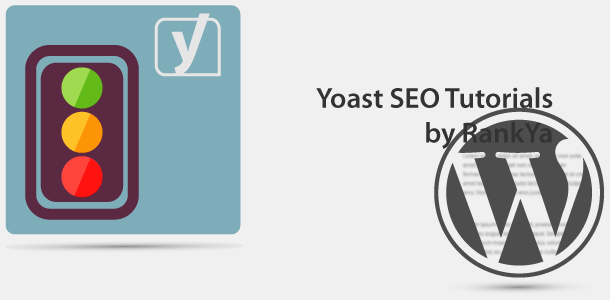Managing a WordPress site? Using Yoast SEO Plugin but unsure as to how to setup and use this plugin? Welcome to RankYa SEO Blog where I show you easy Yoast SEO Tutorial all for FREE.
As you know there are many search engine optimization tutors telling us to waste time by analyzing unneeded features of Yoast SEO plugin (such as focus keywords as well as newly added features which actually confused the WordPress community. You can watch this
Yoast SEO 7.0 Setup Tutorial (March Update) Video Tutorial for Using Yoast SEO Plugin
Yoast has been around for many years now, and I actually believe that the team behind Yoast has gotten confused as to what Google really wants from a typical website for higher Google ranking. Meaning, once upon a time Yoast done what its supposed to, provide quick and easy options for website owners to quickly tap in to changing Titles Meta Description and use XML Sitemap functionality. But now, focus keywords? link analysis?
Because it doesn’t really matter how we use ANY SEO Plugin or manage ANY CMS whether WordPress or Magento or others. SEO requires our understanding of Google, and how the technology behind Google algorithms works. Simplified version:
All websites are made up of HTML code, images, videos, PDF’s etc. But at the heart of Google rankings are keywords and links. Perhaps the Yoast team thinks that they can mimic Google’s complex algorithms which analyze the entire public internet basically in real-time (for example: when a news breaks, Google has the information in its index).
To understand SEO and Google, we need to know that Google is a multilingual global search engine. This means, if I create a lesson regarding Yoast SEO in English, someone typing How to Use Yoast (let’s say in United States may use google.com as opposed to someone in United Kingdom using google.co.uk). Even both country citizens speak English, there are differences in usage of words, keywords as well as how Google will bring about other signals it has for your website.
Google encourages the use of Search Console tools (such as International Country Specific Target Setting) and other techniques for better guiding Google as to the language used on a site (so that it can better analyze the content (keywords and other type of digital content) and rank it in Search Results accordingly).
The reason I say this is because no SEO Plugin be it Yoast or All in One SEO Plugin or any other search engine optimization plugin can analyze the keywords on a website like Google does. To enlighten you, consider this:
Target keywords: Yoast Tutorial
By itself, before Yoast WordPress SEO plugin existed, Google would bring many different results, for Yoast keyword search, but it would NOT bring the results that it now does when someone searches Google. We must also realize that the only worthy settings are the ability to change the page/post SEO Title and create Meta Description as well as XML Sitemap functionality. Because, just using this SEO plugin does NOT mean your website is search engine optimized.
For example: if you want to focus on some keywords you are targeting so that your website is better optimized and ranked in Google. Then, stop using Focus Keywords function of Yoast, but rather, for educational purposes, let me propose this:
- Go to Google Search Engine and use as a dictionary by searching > define: yourtargetkeyword
- Visit Wiktionary and Online Etymology Dictionary to thoroughly analyze your target keyword
- Identify all you can including tenses (past plural present) and others including find synonyms
- Because you must use keywords intelligently guiding Google
Why would you do this? Because that’s what Google does, calculate and analyze words and links and timings, and your job in optimization of your WordPress site is NOT rely on SEO Plugins, but rather your understanding of Google search engine, so that you can include keywords properly to better guide Google to say
Hey Google, as you can see the keywords on my website all mean that very keyword I am using
Also, repeating keywords over and over again won’t help, it has to be inserted naturally as spoken.
There are other Yoast Tutorials I’ve created perhaps you may like to re-watch. However, the first video lesson above will be sufficient enough for your SEO ventures. You should also check out the latest SEO course by RankYa (small investment, big Google ranking gains).
Here’s the safest robots.txt file directive for WordPress which you can build upon
User-agent: Googlebot
Disallow: /cgi-bin/
Disallow: /wp-content/cache*
Disallow: */trackback/$
Disallow: /comments/feed*
Disallow: /wp-login.php?*
Allow: /*.js*
Allow: /*.css*
Allow: /wp-admin/admin-ajax.php
Allow: /wp-admin/admin-ajax.php?action=*
User-agent: *
Disallow: /cgi-bin/
Disallow: /wp-content/cache*
Disallow: */trackback/$
Disallow: /comments/feed*
Disallow: /wp-login.php?*
Allow: /*.js*
Allow: /*.css*
Allow: /wp-admin/admin-ajax.php
Allow: /wp-admin/admin-ajax.php?action=*
Sitemap: https://www.example.com/post-sitemap.xml
Sitemap: https://www.example.com/page-sitemap.xml
Sitemap: https://www.example.com/sitemap/
Simply login to WordPress Dashboard > SEO (Yoast) > Tools > file editor to update your WordPress built website robots.txt setting
Removing Yoast SEO Premium Auto Generated 301 Redirection Rules and Notices
Simply add this your WordPress Theme functions.php file to remove the auto generated annoying 301 redirection. Check RankYa YouTube channel for 301 redirection (what it means how to do it properly), because I promise you that Yoast SEO Plugin 301 settings are incorrect in terms of SEO.
//Yoast SEO Disable Automatic Redirects for Posts And Pages
add_filter('wpseo_premium_post_redirect_slug_change', '__return_true' );
//Yoast SEO Disable Automatic Redirects for Taxonomies (Category, Tags, Etc)
add_filter('wpseo_premium_term_redirect_slug_change', '__return_true' );
// Yoast SEO Disable Redirect Notifications for Posts or Pages: Moved to Trash
add_filter('wpseo_enable_notification_post_trash', '__return_false');
//Yoast SEO Disable Redirect Notifications for Posts and Pages: Change URL
add_filter('wpseo_enable_notification_post_slug_change', '__return_false');
// Yoast SEO Disable Redirect Notifications for Taxonomies: Moved to Trash
add_filter('wpseo_enable_notification_term_delete','__return_false');
// Yoast SEO Disable Redirect Notifications for Taxonomies: Change URL
add_filter('wpseo_enable_notification_term_slug_change','__return_false');



Quickly fix WordPress SEO issues for $$$ if you want to get more traffic for your website and rank better, then you came for the right person! With My 5 Years of Experience In WordPress SEO ISSUES I will do WordPress SEO issues optimization for your site
I am going to approve this comment (edited), just to showcase what not to do when building a successful online business. Basically, don’t spam around other peoples blogs for a quick backlink or offering spam services which are not part of search engine optimization according to Google guidelines. Begin here because then you’ll get somewhere https://developers.google.com/search/docs/beginner/seo-starter-guide
Hi,
I have installed yoast v 9.1 where advance feature is not available .
Can we downgrade from v 9 to 7 ? and in version 7 advance feature is available or not ? can anyone help here please
Thanks
https://github.com/Yoast/wordpress-seo/releases you can delete the folder in your website for Yoast and then reinstall the old version, but remember that its smart to use the latest version. Check out RankYa Blog for setting it up (the User Interface May look different in the latest version, however the settings for good SEO are the same)
Thanks for sharing, first time, i used the all in one seo plugin on my site,. it is not working properly. meta tag not showing on google, then i replaced the all in one with Yoast, it is working properly. i think, yoast seo plugin is best. i will share it on my seo network, how to subscribe here
Great tips on Yoast SEO Plugin its used by most SEO agencies, but what about the latest update Yoast has made https://www.ibtimes.com/yoast-founder-apologizes-over-seo-plugin-bug-affected-search-rankings-2686839
Yes, I’ve created a mailing list update for RankYa followers informing them about this update and wrong setting (also created a video about best settings of Yoast). In fact, there are other settings which are wrong and are affecting rankings right now in the latest Yoast Plugin features. But RankYa followers are always in the know because of the videos I create using Yoast WordPress plugin
my web site not rank
That could mean many things, but you should explore #RankYa Digital Marketing and Search Engine Optimization blog as there is just great how to rank in Google fast related blog posts and videos